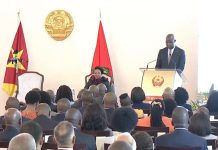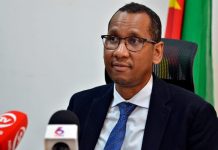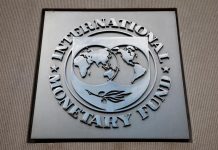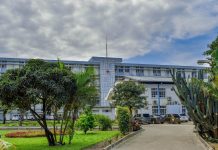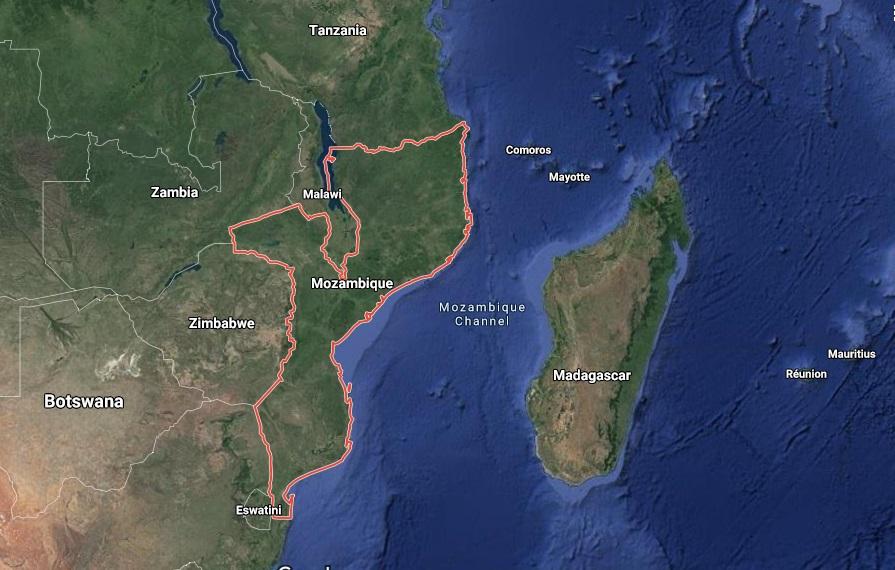
Africa-Press – Mozambique. In this issue
$2 bn Secret debt
+ Credit Suisse fined $475 mn, admits fraud
+ VTB gets off lightly
+ Fines ‘drop in ocean’
+ Manuel Chang?
+ Credit Suisse ‘global criminal conspiracy’
COP26 and future of gas
+ Likely failure of COP26 means gas OK
+ Explainer: Carbon budget
+ Tony Blair: Moz must exploit gas –
+ Blair’s false rosy picture of Moz
Other News
+ UN rejects UK’s gift to Africa
+ WB Doing Business ‘coup attempt’ at IMF
Secret debt
Credit Suisse (CS) admitted the Ematum loan was fraudulent and will pay $475 mn in penalties for the $2 bn secret debt. It also will cancel $200 million of the $390 million still due on the Ematum loan. CS also agreed to repayments to US purchasers of Ematume bonds who CS admits were defrauded – that amount will be set later.
This was set out in a joint settlement with the US Department of Justice (DoJ), US Securities and Exchange Commission (SEC) and the UK Financial Conduct Authority announced 19 October. The settlement documents detail and damn CS for fraud and misconduct (see below). The DoJ will receive $175 mn, the SEC $100 mn, and the UK FCA $200 mn.
Two banks are involved. CS Group with its London based CS Securities (Europe) Ltd (CSSEL) and the London-based investment banking arm of VTB Group, primarily owned by the Russian government.
The secret debt consisted of three loans, all to newly created companies controlled by the security services SISE: £622 mn to Proindicus (CS $504, VTB $118), $850 mn to Ematum (CS $500mn, VTB $350 mn), and $535 to MAM (CS $100 mn, VTB $435 mn). Much of the DoJ action relates only to the 2016 refinancing of the Ematum debt.
VTB gets off lightly, being fined only $6 mn by the SEC for misconduct on the 2016 Ematum loan rescheduling. VTB is seen as the junior partner and the SEC says it did not know about CS’s bribes and kickbacks, nor the misuse of Ematum for security service (SISE) objectives. VTB does not admit or deny the allegations in the SEC’s order, in contrast to CS pleading guilty.
“VTB failed to disclose VTB’s conflict of interest – that the bank was a major creditor under two prior financing arrangements with Mozambican state-owned entities [MAM and Proindicus] with interests adverse, in certain respects, to noteholders. … [VTB] misled regarding material information such as the true nature of the country’s debt, the high risk of default of the bond and that VTB had placed its own interests as a creditor above bondholders,” the SEC says. But that only deserves a tiny penalty.
Detailed documents have been published by all parties and give extensive details of the fraud and corruption.
+ US Department of Justice
+ US SEC (Securities and Exchange Commission) statement plus longer documents on Credit Suisse and VTB
+ UK Financial Conduct Authority (FCA) statement and the more detailed final notice
+ Swiss regulator, FINMA.
+ Credit Suisse
VTB https://bit.ly/Moz-VTB
+ Civil society statements and Jubilee Debt
+ How the FCA calculated its fine by Tim Jones of Jubilee Debt.
+ Costs and consequences of the hidden debt scandal in Mozambique. CIP and CMI, May 2021 https://bit.ly/Moz-Debt-Cost
+ We are continuing to post daily reports of the secret debt trial in Maputo, which will continue through November, on https://bit.ly/Moz-secret-debt.
The “$475 mn is a drop in the ocean compared to the damage the hidden debts have inflicted on Mozambique,” said Denise Namburete, who as then head of the Mozambique Budget Monitoring Forum lobbied politicians and law enforcement agencies in the US, UK, and Switzerland.
“A $475m fine is small beer for a bank as large as Credit Suisse,” said Tim Jones, Head of Policy at Jubilee Debt Campaign. “These fines do little to prevent a similar case happening again.”
Mark Steward, Executive Director of Enforcement and Market Oversight at the FCA, said “The FCA’s fine reflects the impact of these tainted transactions which included a debt crisis and economic harm for the people of Mozambique. The fine would have been higher if not for Credit Suisse agreeing to provide the debt write-off.” But FCA gained as much money as Mozambique – $200 mn each – fines for FCA and a tiny debt cancellation for Mozambique.
The $2 bn fraudulent and secret debt have cost Mozambique at least $11 bn and pushed 2 million people into poverty, according to a May report by CIP (Public Integrity Centre) and CMI (Chr. Michelsen Institute) – https://bit.ly/Moz-Debt-Cost Those costs come from corruption and the economic crisis that hit when the secret debts were revealed.
Mozambique argues that the fraudulent lenders, CS and VTB, and the contractor Privinvest which controlled the money, should pay for the damages caused by the bribes and fraud.
Mozambique has launched High Court cases against CS and VTB, and VTB and other banks have brought actions against Mozambique. In July the High Court merged the cases, which will be heard next year. Mozambique is seeking compensation for losses from debt payments it has made or will make, arising from any of the three loans, including those already restructured, and for macroeconomic losses as a result of the financial crisis caused by the scandal and consequent loss of donor funding.
Credit Suisse pleading guilty in the US, and the list of misconduct in the US documents, will make it harder for CS to defend itself from Mozambique’s claims that the loans were fraudulent and corrupt, and thus it must pay for the damage caused.
The Budget Monitoring Forum on 21 October said “Credit Suisse’s acknowledgment of its responsibility (failure to comply with the law, negligence and involvement of its employees in bribery) … reinforces the idea that debts are odious, they were never to benefit Mozambique and, therefore, FMO continues to demand just compensation, commensurate with the effects and impacts of the scandal, namely, the debt crisis, the reduction in investments in the country (loss of credibility), the withdrawal of cooperation partners, and the economic effects that pushed millions of Mozambicans into poverty.”
Will Manuel Chang go home now?
Then Finance Minister Manuel Chang signed the illegal and unconstitutional loan guarantees, and was arrested in transit in Johannesburg in December 2018 based on a US indictment. He has remained in jail since, as Mozambique and the United States fought to extradite him. The main US target has always been CS and the 19 October resolution of these cases in the end of the road. The US is done with the Mozambique secret debt and will probably drop its extradition request for Chang, who probably can now return to Mozambique – where he is charged and might be tried – or might not.
“Over the course of several years, Credit Suisse, through its subsidiary in the United Kingdom, engaged in a global criminal conspiracy to defraud investors, including investors in the United States, by failing to disclose material information to investors, including millions of dollars in kickbacks to its bankers and a high risk of corruption, in connection with an $850 million fraudulent loan to a Mozambique state-owned entity,” said U.S. Attorney Breon Peace for the Eastern District of New York, quoted in the DoJ press statement.
“Credit Suisse represented to investors that the loan proceeds would only be used for the tuna fishing project. Instead, co-conspirators diverted loan proceeds obtained from investors. Specifically, a contractor [Privinvest] that supplied boats and equipment for EMATUM and that received the loan proceeds from Credit Suisse, paid kickbacks of approximately $50 mn to [CS London] bankers and bribes totalling approximately $150 mn to Mozambican government officials,” the DoJ says.
“Credit Suisse retained two independent industry experts to conduct a market valuation of the tuna fishing boats and other goods the contractor provided for the EMATUM project. Credit Suisse knew that the experts identified a shortfall of between $265 mn and $394 million between the funds raised for the EMATUM loan and the fair market value of the boats and accompanying infrastructure and training the contractor sold to EMATUM. Credit Suisse did not disclose this material information to investors”, said DoJ. According to the SEC, even joint loan leader VTB was kept in the dark. Indeed, CS had been warned by its own employees of corruption and misconduct, but continued with the loans.
And Credit Suisse and VTB failed disclose Mozambique’s high debt levels, that some of that debt was VTB and CS loans to MAM and Proindicus which created a conflict of interest, and that there was a high risk of default.
The SEC says that CS’s financial crime compliance group commissioned and received a third- party diligence report that quoted an anonymous source describing the [Privinvest’s] principal as a “master of kickbacks” and “All sources we spoke to about [Privinvest’s Principal] were confident of his past and continued involvement in offering and receiving bribes and kickbacks” and “raised concerns about the integrity of [Privinvest’s Principal’s] business practices,” CS “acted unreasonably in failing to properly consider the totality of bribery risks surrounding the transaction that came to its attention.”
COP26 and gas
It looks increasingly like the big international climate summit COP26 in Glasgow, Scotland from 31 October to 12 November will not curb fossil fuels. Even the hope to phase out coal has been dashed.
Coal emits the most CO2 – double that of gas – and China had promised bold steps to end the use of coal, including shutting down 600 coal-fired power stations. But in a statement on 12 October, Premier Li Keqiang recognised the seriousness of power cuts and returned to a commitment to coal. “Energy security should be the premise on which a modern energy system is built,” the statement said. “Given the predominant place of coal in the country’s energy and resource endowment [China will] build advanced coal-fired power plants as appropriate in line with development needs. … Domestic oil and gas exploration will be intensified.”
Similarly both Norway and Britain will continue oil exploration. Both the US and UK have partially backed down on their decision not to give export credits for gas fired power stations.
This makes the goal of limiting global heating to 1.5ºC above preindustrial levels almost impossible to reach, and accepts the fossil fuel industry target of 2º, which causes much more damage.
Thus there will be no official opposition to the Cabo Delgado gas project, which will go ahead once security is confirmed.
ExxonMobil Corp is debating dropping Mozambique and Vietnam gas projects, the Wall Street Journal reported yesterday (20 Oct). Exxon is analysing the expected carbon emissions from each project and annual projected emissions from the Mozambique and Vietnam projects were among the highest in Exxon’s pipeline of oil and gas projects. One third-of ExxonMobil’s newly elected board – 4 of 12 members – are activist anti-fossil fuel. Three were nominated by the hedge fund Engine No. 1 which argues that remaining in fossil fuels lowers the value and prospects of an energy company.
China has confirmed it will fund and build a coal-fired power station in Mozambique. The 300 MW power station in Tete will be built by China Machinery Engineering Corporation (CMEC) for the British company Ncondezi Energy. China had said it would stop funding coal power stations, but this one will go ahead.
Greenhouse gases remain in the atmosphere for many decades, continuing to heat the earth. Thus most of the Carbon Dioxide (CO2) we emit now will continue its work heating the earth for the lifetimes of our children. Thus the Intergovernmental Panel on Climate Change (IPCC) developed the concept of a “carbon budget” – how much CO2 can we add to the atmosphere now while still limiting the rise in temperature.
The 2015 Paris agreement committed the world to “holding the increase in the global average temperature to well below 2°C above pre-industrial levels and pursuing efforts to limit the temperature increase to 1.5°C above pre-industrial levels.” It was a political compromise and the difference is significant. Compared to 1.5º, 2º means worse cyclones, more drought, and a fall in food production in Mozambique.
The IPCC estimated the budgets for extra CO2 to ensure the global temperature does to not rise about 1.5ºC or 2º. Using that, we can estimate current budgets. From today, to limit warming to 1.5ºC, our budget is 327 Gigatonnes of CO2 (GtCO2, where a Gigatonne is 1 billion tonnes). To not rise about 2ºC the budget is much larger, 1077 GtCO2. (Climate Change 2021 (Table SM.2) updated by the MCC Carbon Clock)
We are currently adding 42 GtCO2 per year, and at this rate we will have spent the entire 1.5º budget by 2030.
The G7 leaders meeting in Cornwall in the UK on 11-13 June in their final statement committed to “keep the 1.5°C global warming threshold within reach”, thus making clear they were leaving the climate emergency for their children to solve. But our children will be able to maintain 1.5ºC only if they add no CO2 at all. So, yes, within reach for our children, but a massive cost.
The fossil fuel industry has said it is working to the target of 2ºC and not even considering 1.5ºC. Although it means cuts eventually, those are left for the children to make – and, as well, they will suffer the additional damage of 2ºC.
“High Income Countries (HICs) are seen to be prioritising climate mitigation over Africa’s development, restricting development choices and ‘kicking away the ladder’ that they themselves have already climbed,” warns a report from the Tony Blair Institute (14 Oct). “In the short term, there is a real possibility that the global response to the climate emergency puts Africa’s development at risk.”
“Given the urgent need to phase out fossil fuels, the first option would need to come with additional pledges from HICs to curtail their own fossil-fuel production” and to “compensate African nations to keep their fossil-fuel deposits underground.”
Former UK Prime Minister Blair in a forward writes: “Ultimately, Africa must achieve net zero, but not at the expense of its development. If HICs attempt to limit development opportunities – for example, by ceasing funding for energy generated by gas, without making provisions for equally affordable alternatives – they risk condemning countries to continuing poverty and food insecurity.” The report “A Just Transition for Africa: Championing a Fair and Prosperous Pathway to Net Zero” is on https://bit.ly/Moz-Blair-Climate
The report warns that most climate change actions work against African development. They restrict lower cost fuel and fertilizer options by blocking the use of gas. Carbon taxes will add to the prices of imports from Africa and carbon mitigation will add to production costs.
“To industrialise, Africa will need to consume more energy. Globally, there exists a direct relationship between GDP and energy consumption – as countries have industrialised, their energy consumption has increased. Historically this relationship has extended to carbon emissions because of HICs’ traditional dependence on fossil fuels, which offer low-cost, reliable power.”
“African countries should not have to jeopardise their competitiveness by incurring additional costs to address a climate crisis not of their making. Instead, HICs should pay the difference between the
cheapest paths available for development and the most climate-friendly alternatives,” the report argues.
The Blair report devotes more than a page to Mozambique and points to the importance of gas which “constitutes the largest foreign direct investment in Africa of recent times”. It notes: “The discovery of natural gas in Mozambique’s Rovuma Basin has paved the way for unprecedented development pathways that could see one of the poorest nations in the world transform into a thriving middle-income economy within a generation.”
But the Blair Institute seems to have missed that Mozambique has abandoned the development path and is using the gas project purely for the money. The report says “A quarter of Mozambique’s future gas has been set aside for domestic use. Investment in the production of gas-based fertilisers, fuel, electricity and petrochemicals holds the promise of industrialisation and jobs, triggering a virtuous circle with far-reaching benefits spanning food security, livelihoods and the economy.” In reality, that has been abandoned. Last year, all local use of the gas was scrapped and the domestic gas will be sold back to TotalEnergies.
“The success of Mozambique’s gas projects represents a matter of intra- and intergenerational justice, allowing its citizens to enjoy the fruits of development today while helping the transition to a low-carbon economy tomorrow. Harnessing the transformative power of gas is a developmental imperative that serves people, prosperity and planet, while acknowledging the rightful aspirations of Mozambicans.” However that promise seems unlikely to be fulfilled, as the gas has become a resource curse and only the foreign companies and Mozambican elite benefit. jh
Under British government lobbying, the UN on Tuesday (12 Oct) appointed disgraced former UK health minister Matt Hancock as “UN special representative on financial innovation and climate change for the United Nations Economic Commission for Africa”. In a statement Wednesday (13 Oct) Hancock said he would help “promote sustainable development”, alongside working on the economic recovery.
The appointment came just four months after he was dismissed and on the day the UK parliament issued a highly critical report on his handling of the Covid-19 pandemic, which it called one of the country’s worst public health failures. . There was a barrage of criticism. Nick Dearden of Global Justice Now said “The last thing the African continent needs is a failed British politician. This isn’t the 19th Century.” The appointment was withdrawn by the UN on Saturday (16 Oct)
Comment: Hancock was one of the first UK ministers to adopt a Mozambican system to the British government. When he had to quickly purchase millions of pounds in personal protective equipment (PPE) for health workers, he set up a special procurement system which gave priority to Conservative party donors and other friends of the governing party. And purchasing was done without competitive tending or checks to see if the friends had the capacity to supply such specialised equipment.
It became known as the “cronies’ list” and its use in Britain could be seen in Mozambique and elsewhere in Africa as a least tacit support for using contracts to support businesses linked to the ruling party. And the brief hope surely was the Hancock would tell African governments that economic recovery should prioritise the ruling party. jh
Follow up
“Moves are afoot to replace or at least greatly weaken Kristalina Georgieva, the IMF’s managing director since 2019 [by] “some who are unhappy at the direction the IMF has taken under Georgieva’s leadership. Some think it should stick to its knitting and not concern itself with climate change. Some dislike the progressive shift, with less emphasis on austerity, more on poverty and development, and greater awareness of the limits of markets,” wrote Joseph Stiglitz on 27 September. And they are using the World Bank Doing Business scandal to launch “a coup attempt”.
That reading was backed by a 6 October IMF Executive Board statement which failed to support her, and said instead “the Executive Board remains committed to a thorough, objective, and timely review.”
Then late on Monday on 11 October, after eight meetings, the board concluded that its review of the accusations “did not conclusively demonstrate that the managing director played an improper role” and thus it reaffirmed “its full confidence in the managing director’s leadership and ability to continue to effectively carry out her duties”. The Financial Times said the US wanted to dismiss Georgieva because she is seen as pro-China, but large European stakeholders backed her and won out. It said “the IMF may have decided to keep Kristalina Georgieva as its managing director, for now. But that does not mean the controversy over whether she should lead the world’s lender of last resort is over. … a cloud still hangs over Georgieva’s fate,” and the World Bank investigation is ongoing.
Stiglitz strongly backs Georgieva, and writes that “the real scandal is the WilmerHale report itself, including how David Malpass, the World Bank president, escapes unscathed. The report notes another episode – an attempt to upgrade Saudi Arabia in the 2020 Doing Business index – but concludes that the Bank’s leadership had nothing to do with what happened. Malpass would go to Saudi Arabia touting its reforms on the basis of Doing Business just a year after Saudi security officials murdered and dismembered the journalist Jamal Khashoggi.”
Bloomberg (24 Sep) exposed an attempt by Malpass to lower China’s ranking on Doing Business. Malpass, a China critic while he served as the top Treasury international official under President Donald Trump, became World Bank chief in April 2019, and according to internal bank documents soon after he took office he discussed altering the methodology in ways that would hurt China’s standing.
The bank suspended publication of Doing Business in August 2020, after Malpass and other senior officials had been briefed on the rankings for Doing Business 2021. Bloomberg said “people familiar with it said [it] was ready for publication and was seen by Bloomberg News, showed China rising to 25th in the world, from 31st in the previous year’s report. The report showed the U.S. holding at sixth.” https://www.bloombergquint.com/global-economics/world-bank-s-malpass-weighed-changes-that-threatened-china-rank
On Doing Business, Stiglitz writes. writes “A quarter-century ago, when I was chief economist of the World Bank and Doing Business was published by a separate division, the International Finance Corporation, I thought it was a terrible product. Countries received good ratings for low corporate taxes and weak labour regulations. The numbers were always squishy.”
The importance of Doing Business is stressed by the comment of Anne Krueger, a former World Bank chief economist and former first deputy managing director of the International Monetary Fund: “Many observers, including me, regarded the Doing Business reports as the World Bank’s single most important publication”.
The New York-based Council on Foreign Relations calls the revelations “an earthquake” and says “the scandal has diminished the bank’s credibility and underscored the longstanding dodginess of the DB report”.
Five tonnes of cocaine were found on 5 October in containers of soap powder in the port of Rio de Janeiro, with Mozambique as the destination, according to the Brazilian federal police. Soap power is a good choice as they have similar consistency and colour, but the drugs were found by sniffer dogs, the police said. (Policia Federal 7 Oct)
Cocaine may be becoming more important, but heroin remains the key drug, and is exported in ingenious ways. A packet of 247 capulana covered buttons being posted to Canada turned out to be capulana covered heroin. (Carta de Mocambique 7 Oct)
Covid-19:
Beaches closed again as crowds flout limits: With the effective end of the third Covid-19 wave but the disease still in circulation, President Filipe Nyusi announced on 23 September the re-opening of the beaches, but only for recreational activities and not for mass gatherings and consumption of alcoholic drinks. Swimmers had to leave the beaches by 17.00. However, the following weekend crowds gathered at beaches and the ban on alcohol was widely flouted. On 28 September, the government warned that, if the situation did not improve, the government would once again close the beaches. Again the next weekend, beach-goers paid no attention and crowds gathered with little sign of social distancing and plenty of alcohol. So on 6 October, the Council of Ministers ordered the closing of the country’s 18 most popular beaches for the next two weeks.
By
Joseph Hanlon
For More News And Analysis About Mozambique Follow Africa-Press


